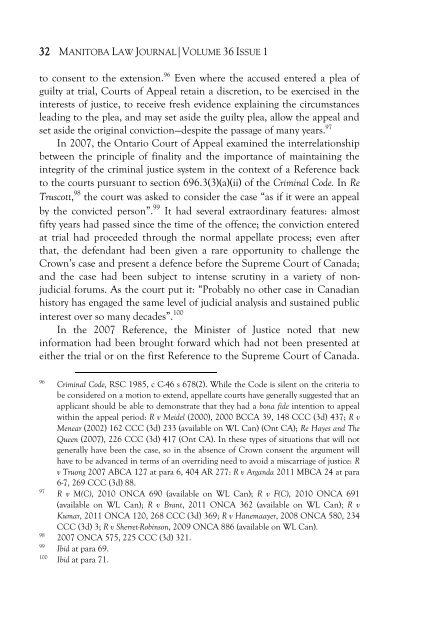Wrongful Convictions.pdf - Robson Hall Faculty of Law
Wrongful Convictions.pdf - Robson Hall Faculty of Law
Wrongful Convictions.pdf - Robson Hall Faculty of Law
You also want an ePaper? Increase the reach of your titles
YUMPU automatically turns print PDFs into web optimized ePapers that Google loves.
32 MANITOBA LAW JOURNAL|VOLUME 36 ISSUE 1to consent to the extension. 96 Even where the accused entered a plea <strong>of</strong>guilty at trial, Courts <strong>of</strong> Appeal retain a discretion, to be exercised in theinterests <strong>of</strong> justice, to receive fresh evidence explaining the circumstancesleading to the plea, and may set aside the guilty plea, allow the appeal andset aside the original conviction—despite the passage <strong>of</strong> many years. 97In 2007, the Ontario Court <strong>of</strong> Appeal examined the interrelationshipbetween the principle <strong>of</strong> finality and the importance <strong>of</strong> maintaining theintegrity <strong>of</strong> the criminal justice system in the context <strong>of</strong> a Reference backto the courts pursuant to section 696.3(3)(a)(ii) <strong>of</strong> the Criminal Code. In ReTruscott, 98 the court was asked to consider the case “as if it were an appealby the convicted person”. 99 It had several extraordinary features: almostfifty years had passed since the time <strong>of</strong> the <strong>of</strong>fence; the conviction enteredat trial had proceeded through the normal appellate process; even afterthat, the defendant had been given a rare opportunity to challenge theCrown’s case and present a defence before the Supreme Court <strong>of</strong> Canada;and the case had been subject to intense scrutiny in a variety <strong>of</strong> nonjudicialforums. As the court put it: “Probably no other case in Canadianhistory has engaged the same level <strong>of</strong> judicial analysis and sustained publicinterest over so many decades”. 100In the 2007 Reference, the Minister <strong>of</strong> Justice noted that newinformation had been brought forward which had not been presented ateither the trial or on the first Reference to the Supreme Court <strong>of</strong> Canada.96Criminal Code, RSC 1985, c C-46 s 678(2). While the Code is silent on the criteria tobe considered on a motion to extend, appellate courts have generally suggested that anapplicant should be able to demonstrate that they had a bona fide intention to appealwithin the appeal period: R v Meidel (2000), 2000 BCCA 39, 148 CCC (3d) 437; R vMenear (2002) 162 CCC (3d) 233 (available on WL Can) (Ont CA); Re Hayes and TheQueen (2007), 226 CCC (3d) 417 (Ont CA). In these types <strong>of</strong> situations that will notgenerally have been the case, so in the absence <strong>of</strong> Crown consent the argument willhave to be advanced in terms <strong>of</strong> an overriding need to avoid a miscarriage <strong>of</strong> justice: Rv Truong 2007 ABCA 127 at para 6, 404 AR 277: R v Arganda 2011 MBCA 24 at para6-7, 269 CCC (3d) 88.97R v M(C), 2010 ONCA 690 (available on WL Can); R v F(C), 2010 ONCA 691(available on WL Can); R v Brant, 2011 ONCA 362 (available on WL Can); R vKumar, 2011 ONCA 120, 268 CCC (3d) 369; R v Hanemaayer, 2008 ONCA 580, 234CCC (3d) 3; R v Sherret-Robinson, 2009 ONCA 886 (available on WL Can).982007 ONCA 575, 225 CCC (3d) 321.99Ibid at para 69.100Ibid at para 71.














